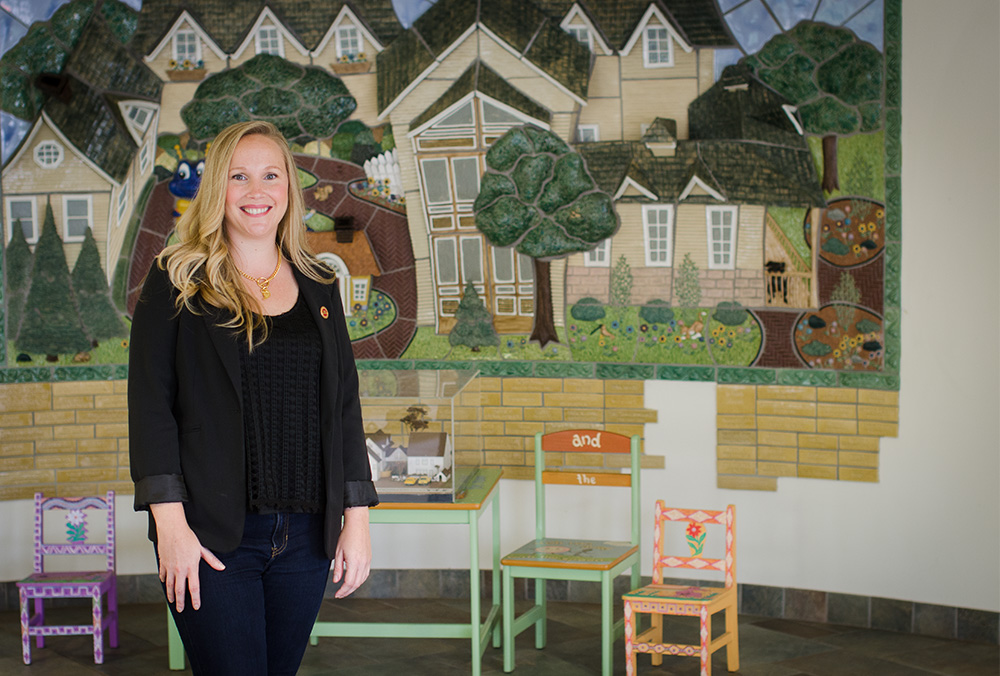Every year more than 400 families stay at the Ronald McDonald House on Oak Street next to the U. The mission is to keep families together while children are receiving treatments at the University’s medical center. The house can shelter up to 48 families at a time.
To make it work, more than 11,000 volunteers help every year at the house, providing services with an annual value over $1 million. All are coordinated by director of volunteers Carynn Roehrick, ’03.
“Volunteers are so refreshing,” says Roehrick, “whether they have unlimited amounts of time or it’s a one-time thing.”
In Ronald McDonald houses nationwide, the average stay is three to five days. At the Oak Street location, a majority of the children are receiving bone marrow transplants, which require long periods of monitoring. Families stay an average of four to six months, making it the longest-staying house in the world. The extended stays also create a closeness within the community.
Roehrick’s job includes managing volunteer applications, scheduling, and orientations, as well as media relations and fund-raising events. But most importantly, she gets to know those giving their time because retention is essential in a volunteer program.
“You need to get to know different people in different ways to be successful on a higher level than just maintaining a program or sticking to a job description,” she says. “The human connection makes it something more.”
Skills for working with diverse families
Roehrick came to the Ronald McDonald House 11 years ago as a student. Seniors in family social science engage in internships at nonprofit organizations in human resources or family services. Roehrick chose the Ronald McDonald House. She was placed in the onsite K–12 school for patients and their siblings from all over the world, a remarkably diverse setting.
“I’ve always been interested in understanding human dynamics,” Roehrick says. She appreciated that her classes cast a wide net on the topic.
Roehrick was able to draw on what she had been learning in her courses. As someone who had grown up in a low-income family with divorce, some of the coursework proved to be introspective. She also enjoyed serious conversations about race, religion, economic status, and how one’s background can shape a person.
“Having professors to push you to have those conversations is so important,” she says.
Upon graduation, Roehrick felt prepared to work in a wide array of social work settings that include family diversity, gender roles and sexuality, and cultural differences. She continued to volunteer at the Ronald McDonald House by helping with fund-raising events. In 2005, she was hired as the family service coordinator, leading field trips, summer programs, and family activities. She became the director of volunteers in 2009.
Coming to the University of Minnesota had always been a dream for Roehrick, who grew up in Faribault.
“My grandfather and an uncle came to the U and I wanted to carry on that tradition,” she says, “so I was adamant about becoming a Gopher.”
Today Roehrick is impressed by the number of University freshmen who want to lend a hand at the Ronald McDonald House—that so many young people with so much on their plates would have the capacity to think beyond their immediate needs to their community. She believes that it’s a perk of living in Minnesota, one of the top states for volunteerism in the United States.
For Roehrick, the biggest takeaway has been knowing how important it is to have a diverse set of approaches for working with people. The ability to be open-minded and to draw on a broad skill set when communicating has proved immeasurably valuable. She is able to use different work styles and maintain expectations based on individuals.
Even with thousands of volunteers, the Ronald McDonald House staff on Oak Street has created a close atmosphere. Finding her place there has given Roehrick a sense of home.
“Our staff is like a family,” she says.
Read more about the Department of Family Social Science, and the Ronald McDonald House on Oak Street.
Story by Ali Lacey | October 2014
